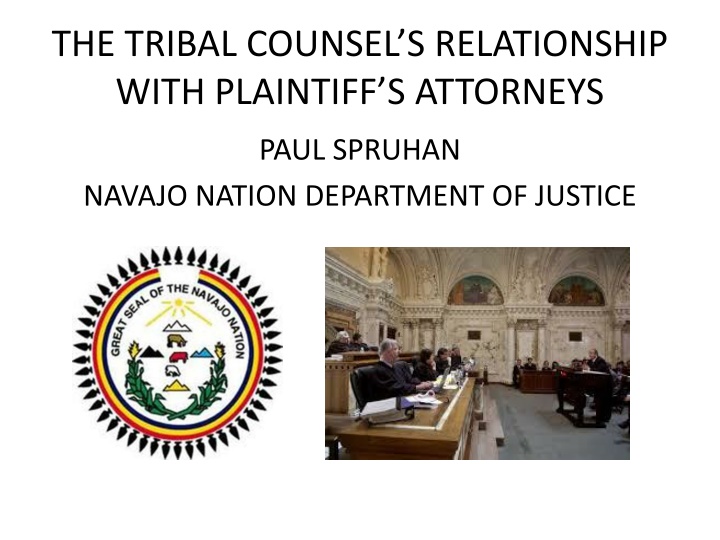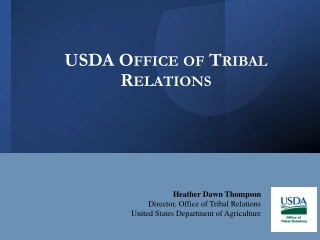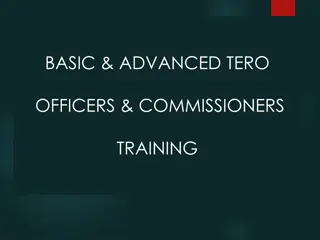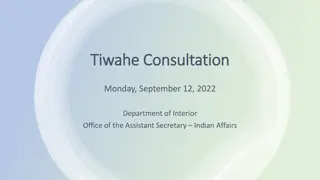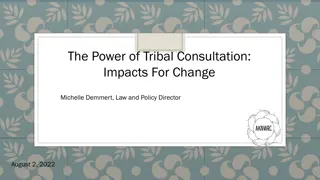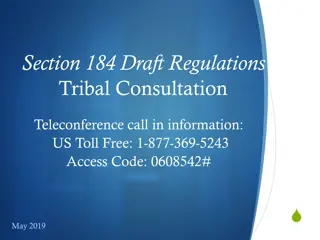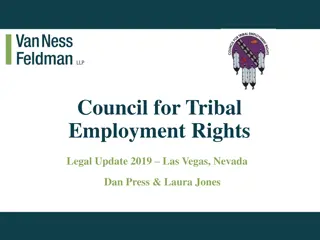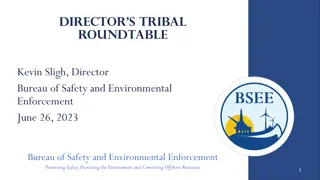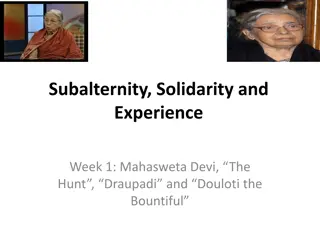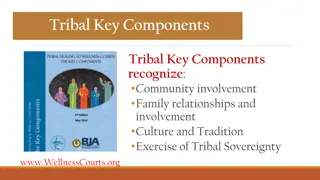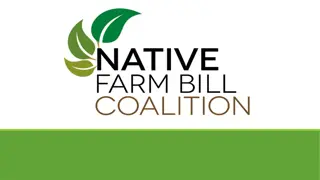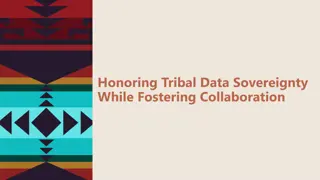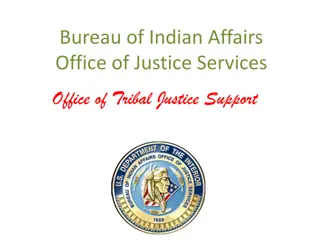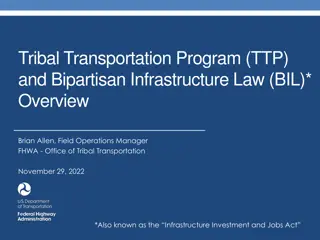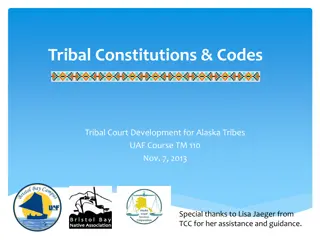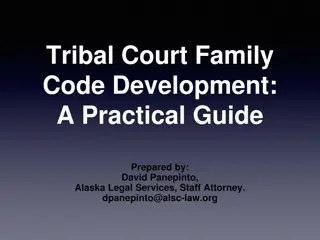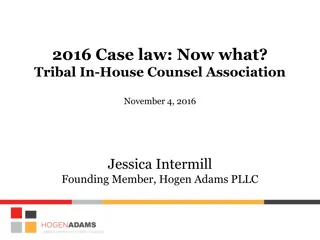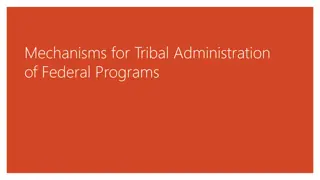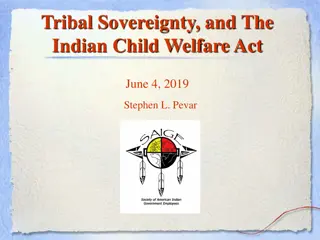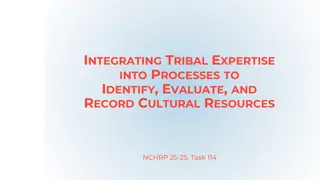Tribal Court Dynamics: Relationship, Reasons, and Examples
Explore the dynamics of tribal court systems, including the relationship between tribal counsel and plaintiff attorneys, potential reasons for using tribal tort law in court, jurisdictional challenges faced, and examples from Navajo and Non-Navajo cases.
Download Presentation

Please find below an Image/Link to download the presentation.
The content on the website is provided AS IS for your information and personal use only. It may not be sold, licensed, or shared on other websites without obtaining consent from the author.If you encounter any issues during the download, it is possible that the publisher has removed the file from their server.
You are allowed to download the files provided on this website for personal or commercial use, subject to the condition that they are used lawfully. All files are the property of their respective owners.
The content on the website is provided AS IS for your information and personal use only. It may not be sold, licensed, or shared on other websites without obtaining consent from the author.
E N D
Presentation Transcript
THE TRIBAL COUNSELS RELATIONSHIP WITH PLAINTIFF S ATTORNEYS PAUL SPRUHAN NAVAJO NATION DEPARTMENT OF JUSTICE
POTENTIAL REASONS FOR USING TRIBAL TORT LAW IN TRIBAL COURT Difference in compensation (e.g. perception that tribal courts will award more in damages, allows punitive damages, or tribal law doesn t cap damages when federal or state law does) Wider zone of compensable parties (e.g. tribal law recognizes wider group of extended family members eligible for compensation) Wider zone of injured parties (e.g. tribal law recognizes compensable loss for miscarriage) Litigation before tribal judge and tribal peer jurors under familiar tribal law (e.g. understanding of cultural beliefs and principles applying to compensation for injuries)
JURISDICTIONAL CHALLENGES Can sue individual tribal trial and appellate judges for prospective injunctive relief to challenge assertion of tribal jurisdiction (Cf. Ex Parte Young) Tribal judges who issued the rulings become involuntary defendants in federal court For Navajo Nation, challenges to adjudicatory jurisdiction have been exclusively torts or employment claims brought by plaintiff attorneys for individual Navajos.
Non-Member Defendant/Appellant v. Tribal Plaintiff/Appellee TRIBAL APPELLATE COURT FEDERAL DIST. CT. Non-Member Plaintiff v. Tribal Defendant AND Tribal Judges (With Exhaustion) (Without Exhaustion) TRIBAL DISTRICT COURT Tribal Plaintiff v. Non-Member Defendant
NAVAJO EXAMPLES Pfizer v. Navajo Nation(2004) (no jurisdiction over product liability case against pharmaceutical company) Ford Motor Co. v. Todecheene(2007) (no jurisdiction over tort claim for defective police vehicle) Macarthur v. San Juan County (2007) (no jurisdiction over employment grievances against state-operated hospital) Red Mesa Unified School District v. Yellowhair (2010) (No jurisdiction over employment grievance) EXC v. Jensen (2012) (No jurisdiction over wrongful death action against tour bus company) Window Rock Unified School District v. Reeves (2013)(No jurisdiction over employment grievance) Gallup School Board v. Henderson (2015) (Pending challenge to employment jurisdiction by New Mexico public school)
Non-Navajo Examples Strate v. A-1 Contractors (1997) (No jurisdiction over car accident tort) Nevada v. Hicks (2001) (No jurisdiction over Section 1983 civil rights claims against state law enforcement) Plains Commerce Bank v. Long Family Land and Cattle Co. (2008) (No jurisdiction over discrimination tort recognized by Cheyenne River Sioux tort law) Dollar General Corp. v. Mississippi Band of Choctaw Indians (2015) (jurisdictional challenge to sexual assault tort recognized by Choctaw law)
POSSIBLE APPROACHES OF TRIBAL COURT DEFENDANTS Ignore the case (e.g. Macarthur non- participation; default) Vigorously defend jurisdiction and coordinate defense with tribal plaintiff s attorney or simply take over the case from plaintiff s attorney Seek dismissal as direct defendant, and continue the case as amicus (e.g. EXC v. Jensen)
PITFALLS OF TRIBAL TORT CASES Plaintiff s attorney has ultimate loyalty to interests of individual clients, not the tribe Tribe may want to settle or not proceed with appeals Tribe may be able to live with narrow jurisdictional ruling and adjust law for future cases, but not have support of plaintiff s attorney to drop the case No real ability for tribe to control long-term legal strategy on jurisdiction
BENEFITS OF TRIBAL TORT CASES Have multiple parties and lawyers litigating the case (e.g. more discovery, more briefing, can strategize on issues to focus on in individual briefs) Tribal government can support individual tribal members in receiving just compensation under tribal law in tribal court for actions of non-members within tribal territory Participation of tribe allows expert Indian law practitioners to assist personal injury/employment lawyers in navigating complex area of federal Indian law
